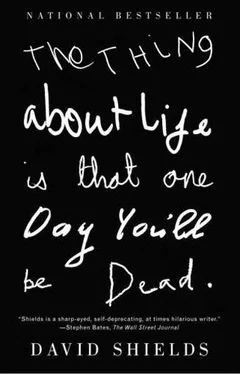Noel Coward, advising a middle-aged friend to stop dieting, said, “This is a foolish vanity. Youth is no longer essential or even becoming. Rapidly approaching fifty-seven, I find health and happiness more important than lissomeness. To be fat is bad and slovenly, unless it is beyond your control, but however slim you get you will still be the age you are and no one will be fooled, so banish this nonsense once and for all. Conserve your vitality by eating enough and enjoying it.”
“The years between fifty and fifty-seven are the hardest,” said T. S. Eliot. “You are being asked to do things, and yet you are not decrepit enough to turn them down.”
In late middle age, the skin in your hands becomes less sensitive to touch. Your skin cells regenerate less often. The skin weakens and dries, the number of sebaceous glands declines dramatically, and all of the tissues of the skin undergo some change: you get wrinkles and gray hair. Wrinkles don’t come from age, though. They come from sunlight, which slowly maims the face, causing wrinkles, mottling, and loose skin. Although the skin loses elasticity and heals wounds more slowly with advancing age, it never completely wears out.
At 59, Neil Young said, “When you’re in your twenties, you and your world are the biggest thing, and everything revolves around what you’re doing. Now I realize I’m a leaf floating along on top of some river.” My father hates this way of thinking, finds it defeatist.
Your blood cholesterol increases. The ability of the blood to maintain a normal level of glucose declines with age. At 60, you’ve lost 25 percent of the volume of saliva you normally secrete for food; it becomes more difficult to digest heavy meats.
When you’re 60, you’re 20 percent less strong than you were in middle age; at 70, you’re 40 percent less strong. You lose more strength in the muscles of your legs than in your hands and arms. You also tend to lose your fast-twitch abilities—a sprinter’s contractions—much more rapidly than your slow-twitch abilities—a walker’s contractions. (Some of this decline can be stalled by exercise, but by no means all. As a rule, the variability between individuals increases with age: almost all younger people will have, for instance, the same kidney function and be able to solve a problem at approximately the same speed, but with older people, some will be normal, others will be very impaired, and most will be somewhere in between.)
Emerson said, “’Tis strange that it is not in vogue to commit hara-kiri, as the Japanese do, at sixty. Nature is so insulting in her hints and notices, does not pull you by the sleeve, but pulls out your teeth, tears off your hair in patches, steals your eyesight, twists your face into an ugly mask, in short, puts all contumelies upon you, without in the least abating your zeal to make a good appearance, and all this at the same time that she is moulding the new figures around you into wonderful beauty which of course is only making your plight worse.”
The year Zola died, he said, at 62, “I am spending delightful afternoons in my garden, watching everything living around me. As I grow older, I feel everything departing, and I love everything with more passion.”
The PR flak Harlan Boll defends his lying about his celebrity clients’ ages by saying, “The American public doesn’t really forgive people for getting older.” Which is of course true. Jackie Kennedy said if she knew she was going to get cancer at 65, she wouldn’t have done all those sit-ups. In jail, O. J. Simpson bemoaned to his girlfriend that the once admirable, apple-like shape of his posterior had collapsed into middle-aged decrepitude. Gravity sucks.
By the time you reach 65, you’ve lost 30 to 40 percent of your aerobic power. The walls of your heart thicken, and you’re more likely to develop coronary disease. Sixty percent of 60-year-old men, and the same percentage of 80-year-old women, have a major narrowing in at least one coronary artery. A stiffening in the walls of the major arteries results in a progressive increase in blood pressure, which imposes an increasing load on the heart. Since the heart has to work harder for each heartbeat and use more energy, the overall efficiency of the cardiovascular system drops significantly. One and a half million Americans suffer a myocardial infarction each year. Seventy percent of heart attacks occur at home. If you survive a heart attack, you’re virtually guaranteed to die eventually of a heart-related illness. My father had a heart attack at 86 (more on this later), had his heart stop beating for 30 seconds during electroconvulsive therapy at 92, and several months ago he was hugely, irrationally afraid that his upcoming colonoscopy (he’d had some bloody stools, and his doctor wanted to figure out what was triggering his ceaseless seesawing between diarrhea and constipation) would cause his heart to stop for good.
At 65, you’ve lost one ounce of your three-pound brain and one-tenth of your brain cells. The motor area of the frontal cortex loses 50 percent of its neurons, as does the area in the back controlling vision and the area on the sides controlling physical sensation. The gyri—the twisting, raised convolutions in the cortex within which you do much of your thinking—experience the greatest atrophy. The brain of a 90-year-old is the same size as that of a 3-year-old. The details of the new Medicare drug benefits program perplex and annoy everyone, including me, but they’ve completely defeated my dad; he no longer grasps concepts he used to grasp. His mental operations do seem, on many channels, newly simple.
Joints age owing to deterioration in cartilage, tendons, and fluid. The fluid contained within joints begins to thin. More friction is created. Nearly everyone age 65 or older shows some abnormality of the joints; one out of two people has moderate to severe abnormality. One-third of American women over 65 have collapsed vertebrae as a result of bone thinning, or osteoporosis. The more bone you have as an adult, the less likely you are to develop osteoporosis. (Generally speaking, it’s best and easiest to head off aging’s ravages when you’re young, which is exactly when you aren’t thinking about them.)
When you’re a young adult, the reflex that tells you it’s time to urinate occurs when your bladder is half full. For people over age 65, the message isn’t received until your bladder is nearly full.
Five percent of the U.S. population live in a nursing home. When I asked my father a dozen years ago whether he’d ever want to consider moving into a retirement home in Seattle, he replied, “I don’t know how long I’ll be working. Right now, I can get out there and cover the games (basketball, baseball, football, etc.) and turn in two or three pieces each week. I’m not down to my last two bits. Still have some money in my savings account, plus the money I get from Social Security and the annuity I bought in 1977, plus what I get each month from the paper. I’m like the man betting in Las Vegas who says, ‘I hope I can break even. I sure could use the money.’ I miss you and Laurie and Natalie and Paula and Wayne [my sister and brother-in-law, who live forty miles south of Seattle in Tacoma] more than words can say. But life at Woodlake offers me many activities. And there’s also the god-awful Seattle weather. I look on the retirement home as a terminal stop. We old-timers joke about those places, calling them ‘God’s waiting room.’ Where the average age is deceased. (Gallows humor.) So I would like to spend the rest of my days in my own apartment here in Woodlake. For one, I couldn’t afford a retirement home. I’m not ready for that type of living. Or spending. Here I quote again from my steno notebook of memorable phrases (don’t know who wrote it or where I read it): ‘Each man picks his own hill to die on.’ My ‘hill’ certainly would not be a retirement home. Ideally, it would be out on a golf course. Bing Crosby and a couple of other well-known people have died on golf courses. Nice way to go if you’ve lived a good share of years. Not fifty or even sixty.”
Читать дальше












